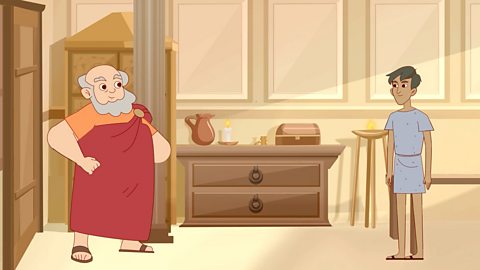Exploring what life was like for Felix and Augusta - two children growing up in Ancient Rome.
JULIA: There was a big difference between how girls and boys were expected to behave in ancient Rome and the kinds of jobs they had to do as they were growing up. Let’s follow Felix and his sister, Augusta, to see what day-to-day life was like.
FELIX: GALLIO! Have you seen my tabula?
GALLIO: You mean this?
FELIX: Oh…er…yeah. Augusta, are you finished yet?!
AUGUSTA: Which one? There’s two of us, remember!
JULIA: Augusta is named after her father, Augustus. All girls were named after their father in this way, which made it difficult when there were sisters.
FELIX: I mean, Augusta Minor!! Y’know, the younger one.
AUGUSTA: Coming!
FELIX: I’m in a hurry! My tutor, the grammaticus, doesn’t like it when I’m late.
AUGUSTA: Mum, can I go to the market now? I’ve finished weaving.
MUM: Yes, but take Gallio with you.
AUGUSTA: Great, thanks!
FELIX: Come on, Gallio, we haven’t got all day.
GALLIO: I’m right behind you.
AUGUSTA: It’s so hot!
FELIX: Yeah, it’s lucky we live right on the bottom floor of the insulae. Imagine having to take water right to the top floor.
AUGUSTA: Yeah, and it’s really cramped up there too!
AUGUSTA: I’m like, sooo sick of weaving. Look at the state of my hands.
FELIX: It’s what girls do, Augusta. Anyway, we’ll always need more cloth, just look at the state of this tunic.
AUGUSTA: Well, you can try weaving then! No thanks! But perhaps Gallio could learn to weave?
GALLIO: I think it’s best left to the experts…
JULIA: In case you’re wondering, Gallio is a slave. It was very common for families to have slaves to do work for them like cleaning or serving food. A few were even allowed to manage some of the family’s money, like Gallio, but most were treated very badly.
AUGUSTA: You’re so lucky being allowed to go to school.
FELIX: Dad can’t afford for us both to go.
AUGUSTA: Tell me about it! Claudia has her own tutor. I want to learn rhetoric so I can speak in the senate.
FELIX: Augusta, women aren’t allowed in the senate, you know that!
AUGUSTA: Well, maybe they just need persuading.
FELIX: I hate the public speaking, it’s so embarrassing. But I like Greek and Latin, and I love geometry.
TUTOR: That will never work.
FELIX: I like the games we play at school too, like follis! That can be fun…most of the time.
AUGUSTA: I prefer board games like tali - or ludus latrunculi.
AUGUSTA: Here we are! Now, Gallio, we need cheese, pepper, figs, and can you remind me to get some garum?
GALLIO: Yes, madam.
JULIA: Garum is made from fish guts, and ancient Romans used it like we use ketchup today. Urgh, yuck!
FELIX: I’m hungry.
AUGUSTA: But you just had breakfast!
FELIX: Oooh the thermopolia!
STALLHOLDER: What can I offer you? Figs?
FELIX: Urgh.
STALLHOLDER: Sea urchins? Dormouse!
FELIX: Ooh, yes please!
JULIA: Mmm. Smells delicious. The thermopolia served hot food to take away. You could say the Romans invented ‘fast food’!
FELIX: Oh, hi, Maximus!
MAXIMUS: Hi, Felix!
FELIX: This is my sister, Augusta.
AUGUSTA: Hi…er…Maximus. Um…nice toga.
MAXIMUS: Er…thanks. Yeah, my sister made it. I got it when I graduated from school. It’s…um…kinda awkward though.
FELIX: Maximus wants to be in the Senate, but I want to be a centurion so I can fight the Gauls!
GRAMMATICUS: FELIX!
FELIX: Oh no, it’s the grammaticus! I’d better go!
GALLIO: Well, I’ll go and get the garum. I’ll let you two get to know each other!
MAXIMUS: Err…so…er, Augusta, eh? That’s a pretty name.
AUGUSTA: UGHHHH.
6. Growing up in Ancient Rome
Julia introduces a narrative episode about two children growing up in Ancient Rome.
Felix and Augusta are brother and sister in a middle-class family. It is early morning and Felix is getting ready to go to see the grammaticus - his teacher - while Augusta has been weaving.
Felix and Augusta leave the house, accompanied by the family's slave called Gallio. On the way to the market they pass an insulae - like a block of flats - the type of accommodation available to most ordinary Romans. Augusta says it is unfair that Felix can go to school whereas she cannot and Felix retorts that the family cannot afford to send them both to school.
The two children describe the sorts of games they enjoy playing and the sorts of occupations they hope to have when they grow up.
At the market they are going to buy a variety a variety of produce, including garum - a popular Roman condiment made from fermented fish guts. At the thermopolia - a fast-food stall - they order dormice, which were a popular Roman snack.
They meet Maximus and when Felix is called by the grammaticus Gallio leaves Maximus and Augusta together to get acquainted…much to Augusta's displeasure.
Duration: 3' 36"
Final words: '…that's a pretty name.' / 'Arghh!'
Video questions
- What are the names of the two main children in the story? (Augusta and Felix)
- Why are both girls in the family called Augusta? (Both are named after their father Augustus, according to Roman convention, and are distinguished by 'Major' and 'Minor')
- Why might living on the top floor of an insulae be difficult? (A long way to carry water; crowded; dangerous in the event of a fire)
- Who goes to the market with Augusta and Felix? (Gallio - the family's slave)
- What does Augusta say she wants to do when she is older? (Join the senate - but because she is female she will not be allowed to)
- What is garum? (A type of sauce made from fermented fish guts, that the Romans used a bit like we use ketchup)
- What is the thermopolia? (A sort of Roman fast-food stall)
- What does the stall-holder offer the children to eat? (figs, sea urchins and dormice - a popular Roman delicacy)
- Who do the children meet at the market? (Maximus - a friend of Felix)
This film is relevant for teaching History within the National Curriculum at KS2 in England and Northern Ireland and equivalent levels in Scotland and Wales.
Further resources
Teacher Notes. document
Download / print the Teacher Notes prepared in partnership with Classroom Secrets (pdf)
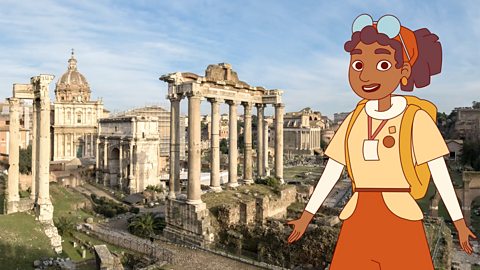
Transcript
Click to download / print the episode transcript

Song: 'Make a mosaic' video
Learn a song about mosaics from our musical 'Rocking Romans!'
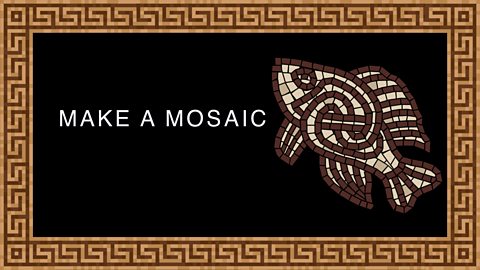
5. The legacy of Ancient Rome. video
Exploring the enduring influence of Ancient Rome on modern Britain and countries around the world.
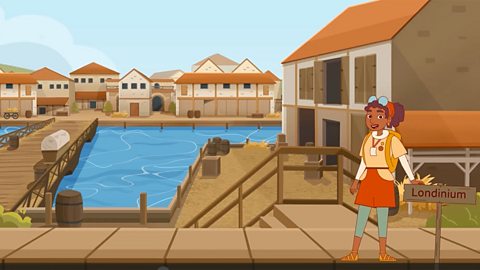
7. Letters from Vindolanda. video
Exploring everyday life for those at Vindolanda fort, based on the Roman letters discovered there.
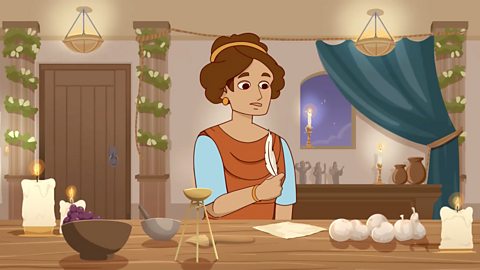
8. The slave and the architect. video
Exploring the life of a slave working for an architect in Ancient Rome and waiting for his freedom.
